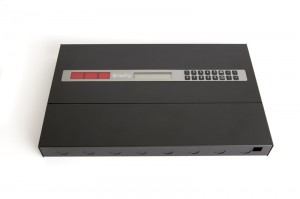Master Clock’s Occupation: provide accuracy and organization.
The word master clock insinuates many things for an individual who has never heard of the device. For one, the fact that there is a “master” clock suggests that there is a clock more superior than the clock we all know that hangs on the walls of our building. The word master also suggests control, meaning it plays a necessary part in an elaborate system. Many will gather this much about the master clock from just hearing its name, but what does the master clock actually do?
The master clock only cares about one thing—providing accuracy and organization for the facility in which it’s installed. Take schools for example. The organization required to get students in and out of class, back and forth from busses, and to and from sports events and standardized testing procedures is highly dependent on the school’s master clock. Without the master, the school’s wall clocks would not stay synchronized and accurate, the bells would not ring on schedule, and many other functions strictly reliant on accurate time would not be properly executed.
Hospitals function in a similar way with the master clock. If accurate and consistent time displays are not present on every single clock in the facility, disarray can occur. Nurses may distribute medication at the wrong time. Doctors could show up late to surgery. When these professionals receive the wrong time from a clock they’ve preconceived to be correct, accidents happen and mistakes are made. The master’s main function in the hospital is to make sure those time displays are consistent and employees within the building are not under false pretenses of which clocks are correct and which are not.
The corporate offices of America operate in a similar fashion as well. Here in the States, business is fast-paced and on-point. Professionals are always on the move, especially when in a sales or marketing position. Meetings are scheduled and expected to occur on-time, which is even more important when traveling to meet with other professionals external from the company. When incorrect time displays are scattered among the office, business men and women are put at risk for showing up late to these meetings. They might not get out the door fast enough to meet with some clients in the next town over. Meetings internal to the company don’t start on-time due to the late stragglers that show up five minutes late—all because the clock in the lunch room said they had an extra five minutes available before the meeting. In this case, the master clock’s ability to synchronize all those clocks in the office is of unparalleled importance.
Without a doubt, the master clock’s occupation to keep accuracy and organization in the aforementioned facilities is beyond important. The professionals that move in and out of these facilities every day, expecting to be able to perform their job correctly and professionally are significantly hindered when the clocks don’t match. So, when hearing the word “master clock”, the information gathered from just the name, while providing an idea of its function, shows only a fraction of the overall description and meaning as described in the above.

